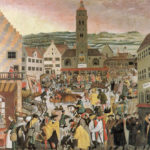Pole is one of those ancient English surnames that appear in various forms throughout the history of the British Isles. Reginald, born 1500 rose rapidly from being an ordained priest to Cardinal, and then Archbishop of Canterbury.
He could have been archbishop and/or King, as he had a strong Yorkist claim to the monarchy through his mother, who was Countess of Salisbury. It is very easy, by the way, to confuse de la Pole with Pole, as a close blood relationship exists between these two distinguished Plantagenet families.
Pole was being closely watched by foreign rulers during the English Protestant Reformation and his own calculated ascent to power, for two important reasons. First, his high birth, and second his strong Catholicism. France and Spain, for example, hardly took their eyes off him.
In 1532 he decided to get out of England and live abroad: this was a wise move, as Henry VIII was King and Thomas Cromwell, Henry’s chief adviser and Minister, did not want Roman Catholics with a valid claim to the throne around, or even alive. Besides, Reginald was not at all in agreement with his King’s marital and religious policies. On the continent, he was made a Cardinal (in 1536), and urged France and Spain to go to war with England on behalf of Catholicism. When this news was brought to Henry he was overcome by a typical Tudor tantrum and had Reginald’s brother and ancient mother killed before you could say ‘axe!’
After Henry died in 1547 Pole waited until the Lady Jane Grey incident provoked by the Duke of Northumberland was over; the teenage couple Jane and Guildford beheaded, Northumberland himself beheaded, and Henry’s daughter by Catherine of Aragon – Mary Tudor, installed as Queen Mary I. In 1554 therefore, he returned to England where he was made welcome by the new Catholic administration, which was getting its own Counter-Reformation into gear. Re-installed as Archbishop of Canterbury, Pole began laying the foundations of a revived Catholicism, but it must be said that he thoroughly disapproved of Mary’s persecution of Protestants and the acrid smell of burning flesh everywhere.
Reginald was one of those few survivors in the sixteenth century who rise to great power without making a small miscalculation which usually costs them their lives. The Thomases More and Cromwell, for example, each became Lord Chancellor, second only to the King, but both were shortened by a head. The Duke of Norfolk managed to stay by Henry VIII through thick and thin, but even he would have been executed if Henry had not died while Norfolk awaited death in the Tower. Henry VII’s son believed in absolute monarchy and absolute tyranny, and his parliaments usually kept pace (in both its English and Latin senses) with him.
Reginald Pole’s good works for English Catholics were cut short by his early death in 1558.









Leave A Comment